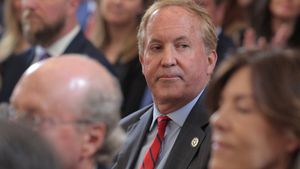So it turns out that if LGBTQ+ are targeted by laws preventing their medical care, they end up feeling less safe and secure. Who could have possibly seen that coming? And now a new study shows just that.
State bans on gender-affirming care for transgender youth are having a negative effect on all LGBTQ+ people, youth and adults alike.
That’s one of the findings from Community Marketing Insight’s 17th Annual LGBTQ+ Community Survey, cosponsored by the Human Rights Campaign Foundation and others. The HRC Foundation released an analysis of the data Thursday, titled “The Impact of Gender Affirming Care Bans on LGBTQ+ Adults.”
“The analysis, which reveals the virtually universal impact gender-affirming care bans are having on LGBTQ+ adults, comes just two months after HRC officially declared a national state of emergency for LGBTQ+ people for the first time ever,” says an HRC press release.
Nearly eight in 10 LGBTQ+ adults report feeling less safe as a result of gender-affirming care bans, and nearly half report that these bans impact the physical and/or mental health of themselves or their loved ones.
With North Carolina legislators’ override of Gov. Roy Cooper’s veto Wednesday, 22 states have enacted laws banning or limiting gender-affirming care for trans youth. Nearly a third of trans young people live in these states, notes the HRC’s analysis, which was prepared before the North Carolina action, and some of the laws affect care for adults as well — for instance, with bans on Medicaid coverage. Several of the state bans have been temporarily blocked by courts while lawsuits proceed, and one, in Arkansas, has been struck down by a court, but that ruling is being appealed.
In the survey, conducted from April through June among more than 14,000 LGBTQ+ adults from every state and the District of Columbia, 79.1 percent of LGBTQ+ adults said gender-affirming care bans make them feel less safe. Among trans and nonbinary adults, the proportion was 94 percent.
Forty-three percent of LGBTQ+ adults said such bans affect the physical and/or mental health of themselves or their loved ones. The number for trans and nonbinary adults was 80.1 percent.
Among LGBTQ+ adult respondents, 62.2 percent said they would not consider moving to a state with a gender-affirming care ban, and 34 percent said they would consider moving to a different state if their current one enacted a ban — or that they had already moved or started steps to move out of state as a result of their state’s ban. The figure for trans and nonbinary people was 53 percent.
This year, more than 550 anti-LGBTQ+ bills have been introduced in 43 states across the nation, and more than 80 have been signed into law — more than double the number from last year, which was previously the worst year on record.
“When anti-LGBTQ+ legislation is introduced, it not only aims to legislate LGBTQ+ people out of all spaces of daily life, it also codifies discrimination and stigma into law,” the report states. “As a result, in addition to directly interfering with the rights of parents and doctors to make the best choices for their children and patients, gender-affirming care bans, and anti-LGBTQ+ legislation in general, can have disastrous effects on the safety, health, and well-being of LGBTQ+ people.”
Such bans “make me, and other LGBTQ+ folks, have suicidal ideation because it makes us feel worthless,” a Two-Spirit trans woman from Kentucky commented in the survey. A cisgender lesbian from North Carolina said, “These laws harm children, families, and people in general.”
“Just two months after HRC declared a National State of Emergency for LGBTQ+ people, this survey reveals that the current climate of hostility and fear is only growing worse, and that gender-affirming care bans are taking a detrimental toll on the physical and mental health of LGBTQ+ Americans,” HRC President Kelley Robinson said in the press release. “Extremist, anti-LGBTQ+ politicians and their allies are waging a dangerous and cruel misinformation campaign that seeks to stigmatize not only gender-affirming care but transgender and nonbinary people as well. Through fearmongering and propaganda, extremist leaders are working overtime to manufacture panic, rile up their base, and coax them into opposing health care for transgender people, even though it’s endorsed by every major medical organization. The rhetoric and misinformation is having a virtually universal impact on LGBTQ+ people, and further plunging us into a state of emergency that’s threatening the health and safety of every LGBTQ+ person.”
The analysis spotlighted Florida, where Republican Gov. Ron DeSantis “has pushed an extremely anti-LGBTQ+ agenda over the last two years,” the report notes. Now he’s seeking his party’s presidential nomination, threatening to take this agenda nationwide. In May, HRC and Equality Florida issued a travel advisory detailing risks associated with travel or relocation to the state.
In the survey, 45 percent of LGBTQ+ adults in Florida and 79.8 percent of trans and nonbinary adults said gender-affirming care bans affected their physical and/or mental health or that of their loved ones.
Seventy-nine percent of LGBTQ+ Floridians and 93.3 percent of those who are trans or nonbinary said the bans make them feel less safe. Many said such laws worsen harmful stereotypes, discrimination, hate, and stigma. Large percentages would like to leave Florida for another state or leave the U.S. altogether.
“I feel like I am losing my basic rights over my body and my right to exist in public spaces,” a transmasculine/nonbinary Floridian said in the survey. “I feel dehumanized.” A cisgender gay man called Florida’s anti-LGBTQ+ laws “hateful and outright demoralizing.” A genderqueer trans man who now lives in Massachusetts said, “I will probably never see my dad again, as he lives in Florida, where it is unsafe for me to be.”
“The results of this survey make clear that we Floridians will be repairing that damage of anti-LGBTQ laws passed in this state for years to come,” Nadine Smith, executive director of Equality Florida, said in the press release. “Conferences are canceling, talent is fleeing and the best and brightest are abandoning our universities, while LGBTQ+ people are feeling more unsafe than ever before. These attacks have to stop.”
We couldn't agree more.































































































































